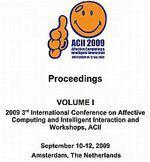
NEWS: Chatbots.org survey on 3000 US and UK consumers shows it is time for chatbot integration in customer service!read more..
Affective Computing and Intelligent Interaction and Workshops ACII 2009 Proceedings

These are the proceedings of ABCI 2009, Affective Brain Computer Interfaces, a workshop that was organized in conjunction with ACII 2009, the International Conference on Affective Computation and Intelligent Interaction, held in Amsterdam, The Netherlands, September 2009. The workshop took place on September 9, one day before the main conference in the Keizerzaal at De Rode Hoed, Amsterdam. The workshop explored the advantages and limitations of using neurophysiological signals as a modality for the automatic recognition of affective and cognitive states, and the possibilities of using this information about the user state in innovative and adaptive applications.
Recent research in brain-computer interfaces (BCI) has shown that brain activity can be used as an active/voluntary, or passive/involuntary control modality in man-machine interaction. While active BCI paradigms have received a lot of attention in recent years, research on passive approaches to BCI still desperately needs concerted activity. More than once it has been shown that brain activations can carry information about the affective and cognitive state of a subject, and that the interaction between humans and machines can be aided by the recognition of those user states.
To achieve robust passive BCIs, efforts from applied and basic sciences have to be combined. On the one hand, applied fields such as affective computing aim at the development of applications that adapt to changes in the user states and thereby enrich the interaction, leading to a more natural and effective usability. On the other hand, basic research in neuroscience advances our understanding of the neural processes associated with emotions. Furthermore, similar advancements are being made for more cognitive mental states, for example, attention, fatigue, and work load, which strongly interact with affective states.
1 related event
New Comment
Only registered members are allowed to comment. or login
or login
